 An ancient word for quiet led to a steaming heap of words — not all of them sounding all that quiet. Words in Old Persian,Old Church Slavonic, Avestan, & Old Norse led etymologists to construct the Proto-Indo-European word *kwyeə-, meaning to rest or be quiet. The big idea is that Proto-Indo-European was an unwritten mother-tongue that led these disparate groups to use similar-sounding words that all meant about the same thing. *Kwyeə- gave us the English word quiet in about 1300. A couple centuries later it also gave us acquiesce, quiescent & quietude. It also gave us a word roughly meaning super-quiet — the word requiem. Apparently being free & clear gives one a sense of quiet, so those who were free & clear of debt, discharged, at liberty, or unmarried, were said in the 1200s to be quit. Hmmm. A legal form of being free & clear is to be acquitted. In time, the freeing sense of quit took over in popular usage: to release, let go or abandon. This free & clear meaning also gave birth to the word quite, (someone who is quite intelligent could also be labelled clearly intelligent). And because getting some rest & quiet takes a little time, *kwyeə- also gave us the words while & awhile. Last but not least, *kwyeə- gave us the word coy. Coy’s original meaning (in the 1300s), was quiet. It only took a hundred years for its meaning to ooze from quiet through placid & gentle to shy & bashful. All that from quiet. Any thoughts? Please let me know in the comments section. Big thanks to Sioux Thompson for inspiring this post & to this week’s sources, Merriam Webster, Collins Dictionary, Etymonline, Oxford Dictionaries, & Wordnik.
0 Comments
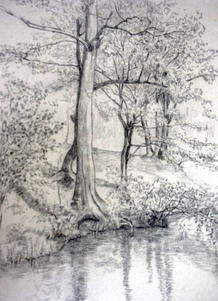 The word stream, a course of water, came to Old English from Germanic languages. Its Proto-Indo-European root meant to flow. Another Proto-Indo-European root meaning to flow gave us the word runnel, a small stream. But wait…there are more! The word creek most likely came from an Old Norse word meaning corner or nook. Etymologists believe the word is related to the word crook, originally meaning full of bends & turns. By the 1500s, creek (also pronounced crick) came to mean a small stream or brook. An Old Norse word meaning stream gave Middle English speakers the word beck. Interestingly, these days we use beck to refer to streams that flow ruggedly over gravel and stones — as many northern European streams do. Most modern English speakers would label a contest of speed with the word race. This meaning kicked in about 1510. Previous to that, race meant the act of running. Race came from an Old Norse word meaning a rush of water, & that meaning has hung around all these years, which is why in some regions, a stream or creek is referred to as a race. The word brook, a stream or creek, came to Middle English from an Old English word meaning to use or enjoy. A stream can also be called a rindle, which came into Old English from Germanic sources used to refer to a brook, stream, runner, or messenger. About 1300 the word branch appeared in English, meaning division of a stem of a tree or bush. Branch’s meaning almost immediately broadened to mean division or contributing member of anything, including a river or stream. So as long as it merges downstream with another creek or river we can call a creek a branch. Some English speakers refer to a stream as a burn. This words comes from an Anglo-Saxon word that meant brook or stream, & is the reason many towns or cities near streams end in something like burn, for instance Melbourne, Gisborne, & Blackburn. A rill is a small brook or stream. This word came to English in the 1530s from one of the Germanic languages, likely coming from a Proto-Indo European word meaning to run or flow. And last but not least, Northeastern Americans got the word kill (meaning stream), from a Dutch word meaning riverbed or channel, which is why so many streams and creeks in Pennsylvania, New York, & New Jersey are referred to as kills. I’d love to know which of these surprised you. Comment away. Big thanks to Sioux Thompson for inspiring this post & to this week’s sources, Merriam Webster, Collins Dictionary, Etymonline, Say Why Do I?, Oxford Dictionaries, & Wordnik.  Here are some more Algonquian words that made their way into English. An Algonquian word meaning powder, dust, or ashes came to English in 1896 meaning worthless. That word is punk. Though the West Indian island Jamaica got its name from the Taino-speaking folks who lived there, the Jamaica of Jamaica Plains in New York is Algonquian. It comes from the Delaware branch of Algonquian & meant beaver pond. In 1937, United States Rubber Products Inc. trademarked the name Naugahyde, a word that patched together the Old English word hide with Naugatuk, the name of the Connecticut town in which the product was made. Naugatuk is an Algonquian word which meant one tree. An Algonquian village near a Connecticut river was situated in a boggy place, so the natives called it Potunck (which meant something like to sink in). In 1846, the word Podunk was born — the name of a mythical & “typical” town featured in a recurring column in the Buffalo Daily National Pilot newspaper. Years later, the meaning oozed toward meaning an insignificant, isolated place. Since 1763, English speakers have used the word caucus — a private meeting of leaders or voters. Though the research isn’t definitive, caucus’s source is most likely an Algonquian word meaning counselor, elder, or advisor. Some Algonquian speakers were impressed by the size of the canoes of another native group (the Chiwere), & called them people of the big canoes. Their name for this group turned into the word Missouri. Though etymologists are still arguing about the origin of the word tuxedo, one of the likely sources is Algonquian. They called a Delaware town P’tuck-sepo, after its crooked river. That town name got applied to Tuxedo Park, New York, which became a “rural resort for wealthy New Yorkers,” & the attire worn by the visiting gentlemen likely picked up the name, tuxedo. Modern English speakers have a richer language thanks to hundreds of contributing languages, including all the various branches of Algonquian. Though English has benefitted from them, not all those languages have survived. It seems to me we should be appreciating them all the more. My thanks go out to this week’s sources, Merriam Webster, Collins Dictionary, Etymonline, & Wordnik. 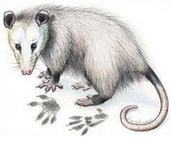 English-speaking settlers on the continent learned a bunch from Algonquian-speaking inhabitants, & this learning didn’t stop centuries ago. Here are a few of the Algonquian words that have become part of English. In 1610, the word opossum (or simply possum) came to English from the Powhatan branch of Algonquian. The original word translates to white dog. The Mikmak branch of Algonqiuan gave us the word caribou in the 1660s. The original word translates to pawer or scratcher, due to the caribou’s habit of pawing through the snow to find edible moss and grass. Just south of Boston is the Great Blue Hill. Before Europeans muscled into the area, an Algonquian-speaking group of people lived there. Their native neighbors referred to them as the people at the large hill, or Massachusetts. Though the people at the large hill sadly no longer exist, the name remains. In the 1670s, English speakers started using the word woodchuck, which comes from the Cree branch of Algonquian & originally referred to the marten, a rodent inclined to live in forests. The Cree word was otchek, but because martens lived in trees, European settlers heard something closer to woodcheck, thus ending up with woodchuck. Most branches of Algonquian had a word meaning shoe, which sounded something like mocassin. In 1610, English speakers started using the word to refer to a soft leather shoe lacking a stiff sole. An inland group of Algonquian speakers labeled a particular hunk of land the place of the wild onion — which sounded something like shekakoheki. In 1833, English speakers learned this word from the French trappers in the area, & made use of it to name that area Chicago. In 1629, an Algonquian word meaning that which is ground or beaten made its way into English to refer to parched corn — so we have the word hominy. We all know the famed location of Orville & Wilbur Wright’s first flight is Kitty Hawk, but the place name had nothing to do with cats, kitties, or raptors — it’s a brutally Anglicized version of the Algonquian place name, which first occurred on English maps as Chickehawk. Nobody’s certain what the original Algonquian name was, or what it meant. Historically, English speakers showed little respect to the many speakers of the various branches of Algonquian. Perhaps we can show a bit of respect now by (at the very least) recognizing the source of some of our English words. My thanks go out to this week’s sources, Merriam Webster, Carolina Designs, Collins Dictionary, Etymonline, & Wordnik. 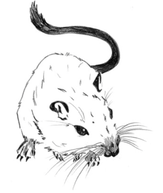 A sizable number of English words come either from or through Arabic. Here’s a tiny sampling. In the 1660s, English speakers started using the word yarbuah, which referred to a mouselike rodent of Africa & Asia Minor, called exactly that in Arabic. But in 1849, yarbuah was eclipsed by a version of yarbuah that travelled through Latin & French on its way to English, but still came from the original Arabic word. Thus, we have gerbil. In the 1670s alcove (a vaulted recess) made its way to English from Arabic through Spanish & French. Demi-tasse (a small cup of black coffee or the cup in which it is served) came to English from Arabic through French in 1842. Our English word ghoul comes from an Arabic word meaning evil spirit that robs graves & feeds on corpses. Ghoul showed up in English in 1786. The first two syllables of Guadalcanal come from an Arabic word meaning river. Guadalcanal first appeared in English in 1568. The first two syllables of Guadalupe came from the same Arabic source in the same year. In about 1600, English speakers began using the word henna, which came from the Arabic word hinna, the name of the small thorny tree from which henna dye is extracted. In 1600 the originally Arabic word gazelle arrived in English after a linguistic tour through North Africa, Spain, and France. Tarragon arrived in English in the 1600s. Though it started out as a Greek word, it came to English through Arabic. The originally Latin word tuna spent a bunch of time in Arabic & Spanish before making its way into English in 1881. And in other tuna news, the word albacore came through Portuguese from an Arabic word that translates literally to milk-cow (due to the albacore’s substantive size). The word sofa showed up in English in the 1620s from Arabic through Turkish. Were any of these words a surprise? I’d love to hear from you. My thanks go out to this week’s sources, Merriam Webster, Collins Dictionary, Etymonline, & Wordnik.  Hindi, which is spoken in India & many other places, has given English speakers some great words. The word loot arrived in English in 1849 from a Hindi word meaning booty or stolen property. Hindi speakers got this word from Sanskrit. In HIndi, a payndit is a learned master or teacher. By the 1670s, this word oozed into English as pundit, a person who offers opinions in an authoritative manner. Pajamas (& pyjamas) came to English in 1800 from a Hindi word meaning loose trousers tied at the waist. Pajamas came to Hindi from a Persian word meaning leg clothing. In 1851 bloke arrived in English. Etymologists haven’t nailed down its source, but the two frontrunners are a Celtic word meaning a large, stubborn person, & a Hindi word meaning a man. Hindi speakers got the word kamarband from Persian, which by 1610 made its way to English as cummerbund, a loose sash worn as a belt. Bandana made its way to English in 1752 from a Hindi word referring to a method of dyeing. This word came from a Sanskrit word meaning bind — perhaps the method of dyeing in question was something like our modern tie-dye. In 1859 the word nark or narc came to English — an informer, not from narcotics. Its most likely source is a Romany word which came from a Hindi word meaning nose. The punch that refers to a type of mixed drink appears to have come from the Hindi word for the number five — reportedly the number of ingredients in the first punch. This particular meaning of punch came to English in the 1630s. The word cot, a small, light, bed, first appeared in English in the 1630s from a Hindi word meaning couch or hammock. In 1915, the Hindi word meaning pleasant, happy, & healthy, gave us the word cushy. Interestingly, it has no relationship to the word cushion. We English speakers owe a thank you note to the Hindi-speaking world. For which of these words do you feel most grateful? My thanks go out to this week’s sources, Merriam Webster, Collins Dictionary, Etymonline, & Wordnik. 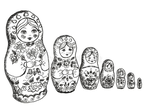 The Russian language is not responsible for the Russian government's actions, but it is responsible for heaps of English words that come from Russian. Most those words are no surprise at all: borzoi cosmonaut babushka Bolshevik ruble balalaika tundra commisar stroganoff samoyed vodka tsar pogrom Kalashnikov gulag Then there are Russian words that made their way through Yiddish before arriving in English: The Russian word blinyets -- meaning little pancake -- became the Yiddish word blintze, which in 1903 became the English word blintz. The Russian word knysh — a type of cake — became the Yiddish word knish, which arrived unchanged in English in 1930. The Russian word latka — a patch — was figuratively used to refer to a pastry. This figurative meaning made its way into Yiddish, then became the English word latke in 1925. Some words made it to English from Russian in other ways: Parka made its way to English in 1780 through Aleut. The Sanskrit word sramana-s referred to a Buddhist ascetic. By the 1690s it landed in English as shaman, but not before a wild linguistic road trip through Prakrit, Chinese, Tungus, and — of course — Russian. Yurt — a house or hut — came from one of the Turkic languages, then spent centuries in Russian before getting to English in 1784. Last but not least, etymologists are pretty sure the word hamster — first appearing in English in 1600, & replacing the inelegant term German rat — comes from a mash-up of the Russian word for the Asian rodent cricetini & the Lithuanian word for ground squirrel. Which of these sounds least Russian to your ear? My thanks go out to this week’s sources, Merriam Webster, Collins Dictionary, Etymonline, & Wordnik.  It’s no surprise that English has appropriated some of its words from Korean. Other English words didn’t come from Korea at all, but managed to come through Korea. Here are a few. Taekwondo came to English in 1967. It’s made up of three words from the Korean language: tae =kick + kwon = fist + do = art, way or method. Kimchi, a spicy, pickled, vegetable mixture, appeared in English in 1898 from Korean. Skosh is a Japanese word meaning few, little, or some. American forces introduced skosh to English during & after serving in the Korean War. American forces during the Korean War also gave us the precipitous retreat meaning of the word bug -- let’s bug outta here! Though the word chopper (one who chops) has been a part of the English language since 1550, it was members of the American military during the Korean War who began using chopper to refer to a helicopter. In Chinese, xi nao means attempt to alter the thoughts of another through psychological techniques. American military members in Korea during the Korean War directly translated this Chinese figure of speech to English, giving us the word brainwash. Though it would be reasonable to assume the Korean word mani (a large number of people or things) might be the root of the English word many (a large number of people or things), these words developed separately from one another & have no etymological relationship at all. Funny how these pressing issues never quite get into the news feed eh? My thanks go out to this week’s sources, Merriam Webster, Collins Dictionary, Etymonline, & Wordnik.  Most of us can imagine the logic that would lead an ancient verb meaning to leanto give birth to these words: lean ladder lid low decline incline recline declivity Though it’s a bit of a logical stretch, most of us can also invent a path for this ancient word meaning to lean to have given us the word climax. Some less likely siblings of lean’s precursor, though, need a bit of explanation. When the word climate appeared in English in the 1300s, it came from this same ancient root because climate referred to horizontal zones on the earth’s surface, measured against the slope (or lean) of the globe’s surface. Within a century, scientists began to focus more on the weather in those zones than on the land itself, & climate began its ooze into its modern usage. Also in the 1300s, English borrowed a word from Anglo-French to mean one who lives under the patronage of another (one who leans on his/her patron) — client. This Anglo-French word also came from that ancient word meaning lean, & within a century assumed the meaning a lawyer’s customer. Two centuries later, client’s meaning broadened to mean any businessperson’s customer. Because a person tends to lean before completely taking to bed, in the early 1600s a related word began to mean a bedridden person. Soon, the word began to refer to a medical facility housing bedridden people, & so today we have the word clinic. For those who are wondering, the lean that means thin, spare, with little flesh or fat came from an entirely different source & has nothing to do with all this. I’d love to hear whether any of these leaning words surprised you. My thanks go out to this week’s sources, Merriam Webster, Collins Dictionary, Etymonline, & Wordnik.  The Proto-Indo-European word *wer- meant to watch out for or perceive. It gave us the words aware, beware, wary, & guard. *Wer- also gave us some words that define some of the things people might be wary of losing: wares, warehouse, & reward And some words that involve storing or protecting those wares: wardrobe, steward, reverend, warden, & guard (the noun) It even gave us the word lord, which in the lower case refers to he who guards the loaves & in the upper case can refer to a British noble, or in Christianity, God. Then there are *wer-’s offspring that help label how we might look up to those who watch over things for us: regard, revere, & reverence And what would we do without outliers? These unlikely words also grew out of this same fruitful root: hardware, panorama, avant garde, & software To confuse matters even more, this is only one of the four Proto-Indo-European *wer-s linguists have identified. The other three meant to cover, to bend, & to lift. Ah, Language. Nothing like it, eh? My thanks go out to this week’s sources, Merriam Webster, Collins Dictionary, Etymonline, & Wordnik. |
I write for teens & tweens, bake bread, play music, and ponder the wonder of words in a foggy little town on California's central coast.
To receive weekly reminders of new Wordmonger posts, click on "Contact" & send me your email address. Archives
November 2023
|

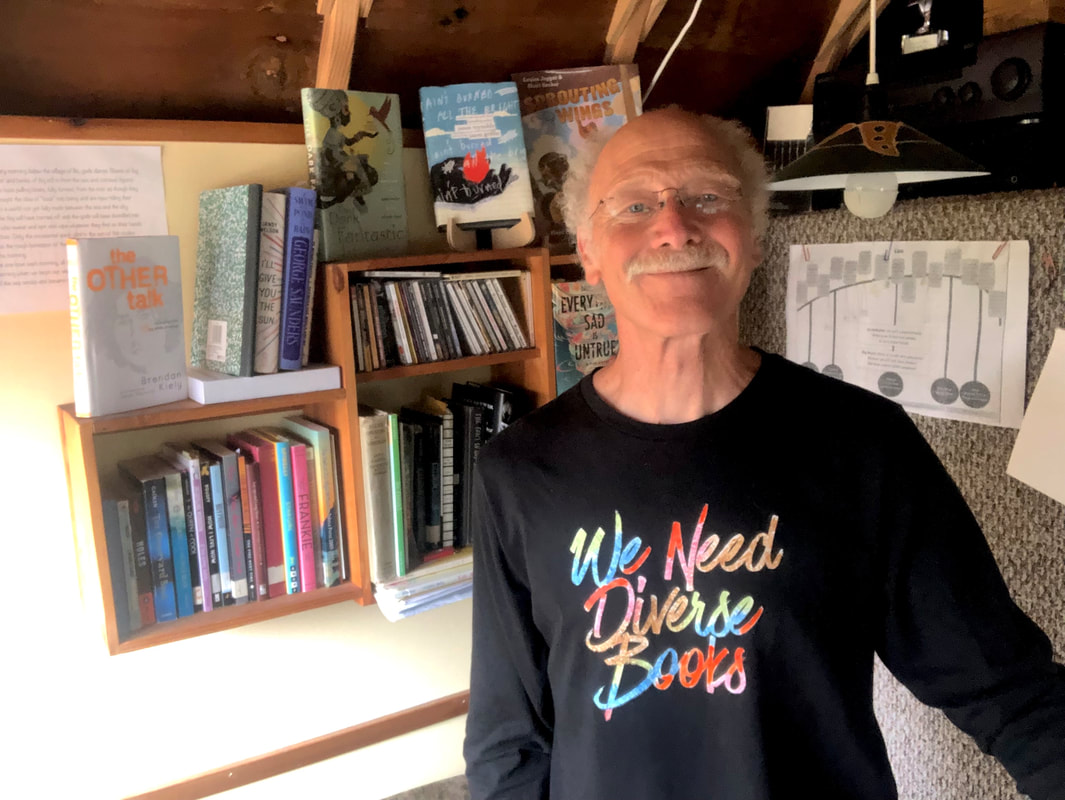
 RSS Feed
RSS Feed